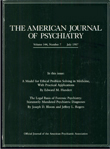Topiramate for Binge-Eating Disorder
To the Editor: Topiramate is a broad-spectrum neurotherapeutic agent that may have utility in treating some psychiatric disorders. Additionally, a retrospective review of epilepsy patients treated with topiramate (1) has suggested that reduced appetite and weight loss may be associated with this drug. Binge-eating disorder is a novel diagnostic entity that appears in appendix B of DSM-IV as a diagnostic category requiring further study. Binge-eating disorder affects a substantial group of obese patients and could have a negative impact on their treatment (2). To our knowledge, the only publication on the use of topiramate in binge-eating disorder is a case report of 13 patients with comorbid bipolar or major depressive disorder (3). We report on a morbidly obese woman with binge-eating disorder with no neuropsychiatric comorbidity who failed to respond to other agents and was successfully treated with topiramate.
Ms. A, a 22-year-old woman who had been overweight since age 18, was referred to our unit for help in losing weight. She had failed to lose weight by several means, including nutritional counseling, pharmacological treatments with amphetamine-like anorectic agents, and 60 mg/day of fluoxetine. She could not tolerate sibutramine, 15 mg/day, because of the side effects of tachycardia and nervousness. At her first visit she weighed 109 kg and was 1.60 m tall; she had a body mass index of 42.5 kg/m2 and fulfilled the proposed DSM-IV criteria for binge-eating disorder without psychiatric or neuroendocrine comorbidity. Her eating patterns were characterized by periods of eating regular meals alternating with brief restrictive diets. During the last 4 years, she had been having binge-eating episodes 3–4 days a week.
After a period of nutritional counseling, Ms. A still experienced a mean of 4 days a week of binge-eating episodes, so we prescribed topiramate. The initial topiramate dose of 25 mg b.i.d. for 2 weeks was followed by an increase of 25 mg every week until she reached the target dose of 75 mg b.i.d. At the end of the first 2 weeks of treatment, she showed a marked reduction from 4 days to 1 day of binge eating per week, and the total number of binge-eating episodes per week dropped from eight to two. From the first until the fourth month of treatment, Ms. A was completely well and had no more binge-eating episodes. Her weight was 98.6 kg (body mass index=38.5 kg/m2). Somnolence in the beginning of treatment was the only medication side effect.
This report emphasizes that controlled studies are warranted to confirm these preliminary observations that topiramate is useful in the treatment of patients with binge-eating disorder.
1. Privitera MD: Topiramate: a new antiepileptic drug. Ann Pharmacother 1997, 31:1164–1173Google Scholar
2. deZwann M: Status and utility of a new diagnostic category: binge-eating disorder. Eur Eating Disorder Rev 1997; 5:226–240Crossref, Google Scholar
3. Shapira NA, Goldsmith TD, McElroy SL: Treatment of binge-eating disorder with topiramate: a clinical case series. J Clin Psychiatry 2000; 61:368–372Crossref, Medline, Google Scholar



